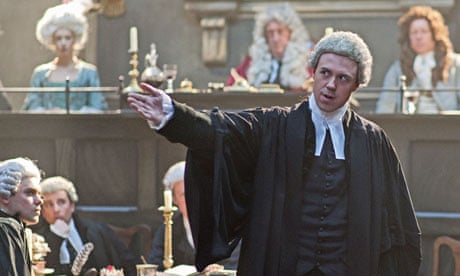I've been watching BBC1's Garrow's Law: Tales from the Old Bailey, with some pleasure. It is based on a real barrister, William Garrow, a pioneer of the art of cross-examination and a fearless advocate in the defence of prisoners and other unfortunates, who were, at that time, rarely properly represented in court. But my enjoyment was mitigated by irritation at the BBC's continuing failure to get one particular bit of courtroom procedure right – the judge's use of the wooden gavel, much banged in Garrow's Law and many other BBC dramas containing scenes in court. In reality, English judges have never had gavels – not in Garrow's time, not now, not ever.
The BBC has a lot of form on this issue. In this and other columns, I have frequently upbraided it over this particular error. So have others. My criticisms have been met with two main responses. The first – "we didn't know" – doesn't say much for the quality of the research; the presence or lack of a gavel would hardly have been difficult to ascertain.
The other defence claims dramatic licence. This is nonsense. I do not accept that the wielding and banging of a gavel is vital to improve the dramatic effect of a trial scene. I was told a few years ago that the protests of a lawyer specifically hired to advise on correct legal procedure were overruled by a producer who, using that excuse, deliberately decided to show viewers something which he knew to be factually wrong.
I would not mind as much if BBC drama programmes did not boast about how careful they were to do their homework. We have been taught to accept, for example, that dramas set in past eras would be accurate in their costumes, their language, their modes of transport and so on. We are rightly upset when anachronisms and solecisms are found. We still look to the BBC to get things right.
I have a more serious point to make about legal matters. Viewers in this country are not able to see and learn how criminal trials operate unless they visit the courts in person. We do not allow the filming of court proceedings – other than, since last month, those of the new supreme court – and there are good reasons for that ban, which I won't go into here. The result, though, is that most people's knowledge of what goes on inside our courtrooms is acquired by way of television or film. The problem is that we see far more American legal dramas than English. Our perception of court procedure is largely based on the American model, where, among many other differences, the gavel plays a lively part.
It is therefore important, for educational purposes, that when the English criminal justice system is being shown, it is presented accurately, particularly as our schools don't teach much about it. Opportunities to show millions of people how it really works must not be squandered. Of course I'm not suggesting that, by itself, a gavel in an historical drama set two centuries ago makes a difference. But such mistakes are made in contemporary drama, too; the gavel is not the only subject of procedural legal howlers, and the BBC not the only offender. Cumulatively, it matters.
